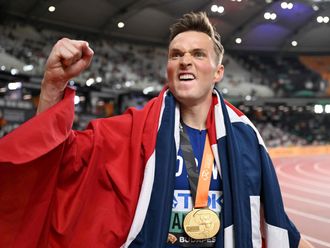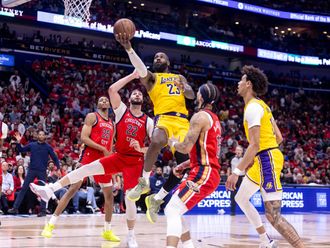Abu Dhabi: It was an engaging hockey debate during 2004 Athens Olympics, involving two of the biggest icons of the subcontinent: Dhanraj Pillay of India and Sohail Abbas, the penalty corner specialist from Pakistan.
Pillay strongly believed that the future of Asian hockey still lay in the traditional approach, and the off-the-ball running didn’t fit into his concept or style of play. While Pillay felt that it will be ridiculous to see him running around the turf without the ball and touching it only once or twice, Abbas was of the view that it was time to throw away the clothes that we didn’t fit in to.
He had then said: “It was time for the two nations to think beyond the contests between each other as world hockey had gone way ahead.”
Abbas had a point as from the time India last won the Olympic Gold in 1980 and Pakistan in 1984, hockey rules had tilted the game heavily in favour of the Europeans. Their representation in the world governing body had grown and the Asian teams have had very little say. The offside rule was taken out and players could now sleep in front of the goalkeeper for the full 60-odd minutes — waiting to just flick it in. Power play had taken over, the stick work and dribbling had clearly taken a firm beating.
Eight-time Olympic gold medallists India struggled and finished seventh at Athens, while Pakistan stood fifth. At the Olympic Park in London 2012, India finished last but on Friday night, at the same arena, the world witnessed a team that can be called a part of the resurgent India.
They lost the Champions League title to the most dominant nation the sport has seen — Australia. In the 60-minute goalless duel, the entire hockey world and the Kookaburras were made to realise that India was salvaging a part of their lost glory.
The 3-1 shoot-out result, marred by a controversial decision that delayed the winners from getting a hold on the trophy for a good hour and a half, may not be enough to say that India would certainly do well at the Rio Olympics but they would certainly be a force. The silver medal has given the much needed spark and the Indian hockey fans’ expectations will go over the roof as Rio approaches.
The Indian team has clearly taken giant strides under the guidance of a shrewd tactician, Dutch coach Roelant Oltmans and the jury’s embarrassing delay in announcing the winner was a clear indication that under him, Asian voices cannot go unheard or addressed.
The crux of India’s transformation is the fitness, the fearless play and immense self-confidence. There are players such as V.R. Raghunath and Rupinder Pal Singh in the defence, who have the power to shield the best in business. Manpreet Singh and S.V. Sunil have showed tremendous agility upfront. They cannot only penetrate the best defence but can immediately sprint back to render more support to their own backline. Harmanpreet Singh was also flawless at the back and he was rewarded for his effort with the best young player of the tournament award.
More importantly, this success was least expected in the absence of four of India’s top players, especially veteran Sardar Singh and ace drag-flicker Rupinder Pal Singh, rested as part of Oltmans’ rotation policy.
Goalkeeping has always been a big worry for India over the years but now India have a steadfast PR Sreejesh, whose anticipation has been flawless and the testimony to that fact was that he didn’t let the Aussies score from the 10-odd penalty corners they earned.
However, the major grey area needing urgent attention is on not giving away the ball too easily in the rival defence. They also have to guard against piling on too much pressure on Sreejesh by handing over too many penalty corners cheaply.












